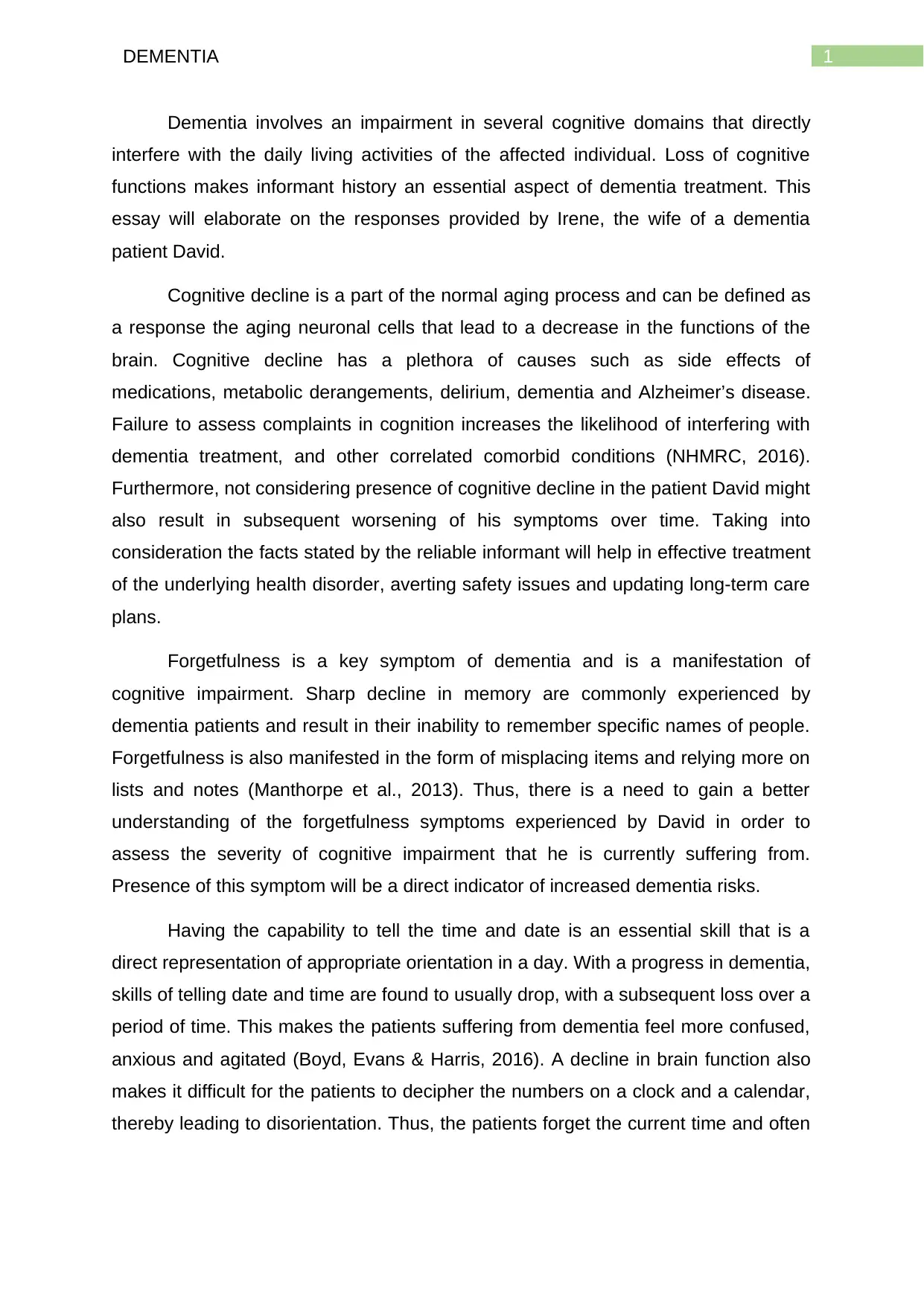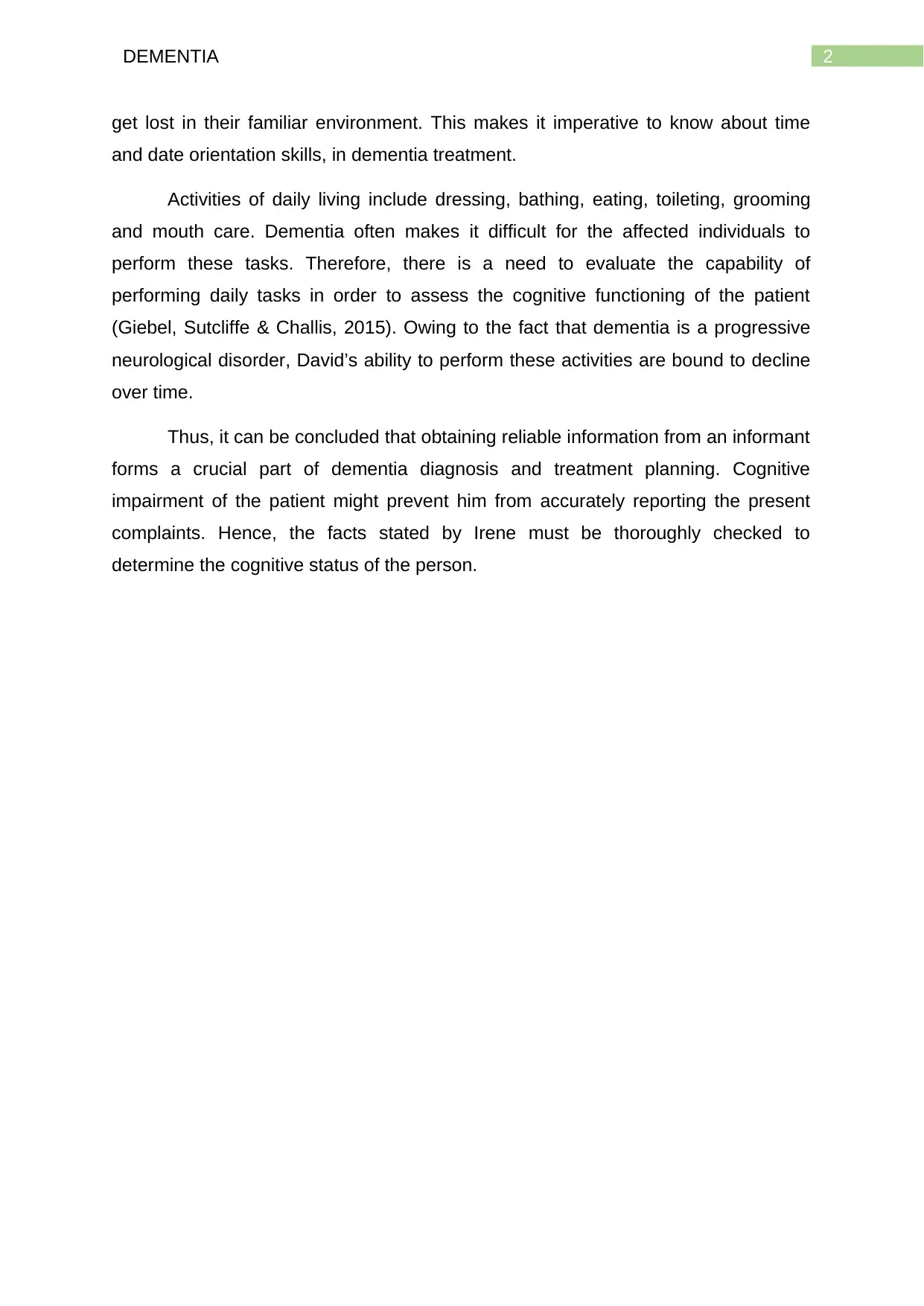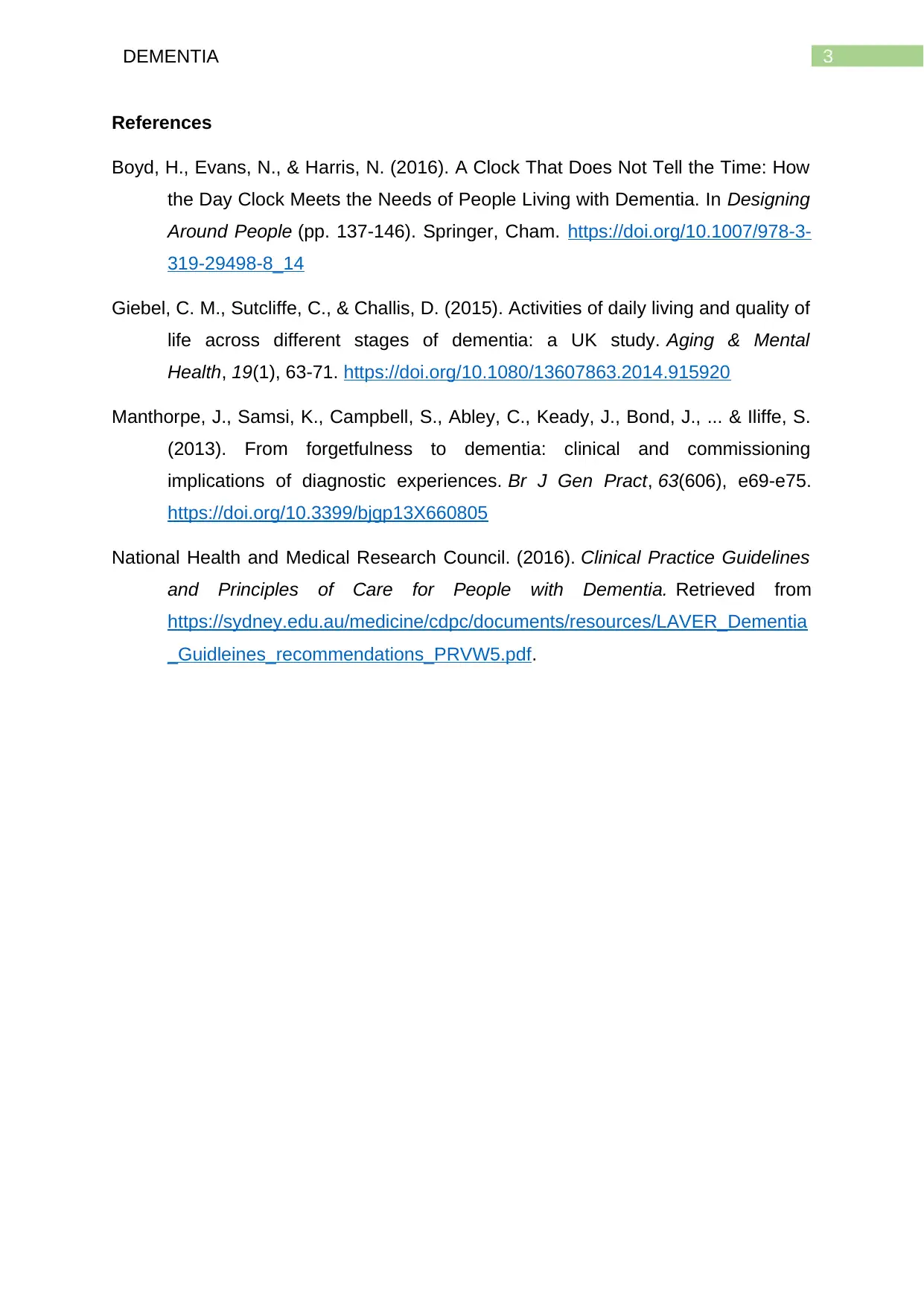CAD104 Assessment: Utilizing Informant History for Dementia Care
VerifiedAdded on 2023/06/08
|4
|812
|284
Case Study
AI Summary
This case study examines the importance of a reliable informant, Irene, in the dementia diagnosis and treatment planning of her husband, David. It highlights that cognitive decline, a key symptom of dementia, can manifest as forgetfulness and disorientation, impacting the ability to perform daily living activities. The essay underscores the necessity of incorporating informant history to accurately assess the severity of cognitive impairment and to inform effective treatment strategies, avert safety issues, and update long-term care plans. The study references scholarly articles and clinical practice guidelines to support its arguments, emphasizing the progressive nature of dementia and the critical role of informants in managing the condition.

Running head: DEMENTIA
CAD104
Assessment Task 1 Part A
Name of the Student
Student Number
CAD104
Assessment Task 1 Part A
Name of the Student
Student Number
Paraphrase This Document
Need a fresh take? Get an instant paraphrase of this document with our AI Paraphraser

1DEMENTIA
Dementia involves an impairment in several cognitive domains that directly
interfere with the daily living activities of the affected individual. Loss of cognitive
functions makes informant history an essential aspect of dementia treatment. This
essay will elaborate on the responses provided by Irene, the wife of a dementia
patient David.
Cognitive decline is a part of the normal aging process and can be defined as
a response the aging neuronal cells that lead to a decrease in the functions of the
brain. Cognitive decline has a plethora of causes such as side effects of
medications, metabolic derangements, delirium, dementia and Alzheimer’s disease.
Failure to assess complaints in cognition increases the likelihood of interfering with
dementia treatment, and other correlated comorbid conditions (NHMRC, 2016).
Furthermore, not considering presence of cognitive decline in the patient David might
also result in subsequent worsening of his symptoms over time. Taking into
consideration the facts stated by the reliable informant will help in effective treatment
of the underlying health disorder, averting safety issues and updating long-term care
plans.
Forgetfulness is a key symptom of dementia and is a manifestation of
cognitive impairment. Sharp decline in memory are commonly experienced by
dementia patients and result in their inability to remember specific names of people.
Forgetfulness is also manifested in the form of misplacing items and relying more on
lists and notes (Manthorpe et al., 2013). Thus, there is a need to gain a better
understanding of the forgetfulness symptoms experienced by David in order to
assess the severity of cognitive impairment that he is currently suffering from.
Presence of this symptom will be a direct indicator of increased dementia risks.
Having the capability to tell the time and date is an essential skill that is a
direct representation of appropriate orientation in a day. With a progress in dementia,
skills of telling date and time are found to usually drop, with a subsequent loss over a
period of time. This makes the patients suffering from dementia feel more confused,
anxious and agitated (Boyd, Evans & Harris, 2016). A decline in brain function also
makes it difficult for the patients to decipher the numbers on a clock and a calendar,
thereby leading to disorientation. Thus, the patients forget the current time and often
Dementia involves an impairment in several cognitive domains that directly
interfere with the daily living activities of the affected individual. Loss of cognitive
functions makes informant history an essential aspect of dementia treatment. This
essay will elaborate on the responses provided by Irene, the wife of a dementia
patient David.
Cognitive decline is a part of the normal aging process and can be defined as
a response the aging neuronal cells that lead to a decrease in the functions of the
brain. Cognitive decline has a plethora of causes such as side effects of
medications, metabolic derangements, delirium, dementia and Alzheimer’s disease.
Failure to assess complaints in cognition increases the likelihood of interfering with
dementia treatment, and other correlated comorbid conditions (NHMRC, 2016).
Furthermore, not considering presence of cognitive decline in the patient David might
also result in subsequent worsening of his symptoms over time. Taking into
consideration the facts stated by the reliable informant will help in effective treatment
of the underlying health disorder, averting safety issues and updating long-term care
plans.
Forgetfulness is a key symptom of dementia and is a manifestation of
cognitive impairment. Sharp decline in memory are commonly experienced by
dementia patients and result in their inability to remember specific names of people.
Forgetfulness is also manifested in the form of misplacing items and relying more on
lists and notes (Manthorpe et al., 2013). Thus, there is a need to gain a better
understanding of the forgetfulness symptoms experienced by David in order to
assess the severity of cognitive impairment that he is currently suffering from.
Presence of this symptom will be a direct indicator of increased dementia risks.
Having the capability to tell the time and date is an essential skill that is a
direct representation of appropriate orientation in a day. With a progress in dementia,
skills of telling date and time are found to usually drop, with a subsequent loss over a
period of time. This makes the patients suffering from dementia feel more confused,
anxious and agitated (Boyd, Evans & Harris, 2016). A decline in brain function also
makes it difficult for the patients to decipher the numbers on a clock and a calendar,
thereby leading to disorientation. Thus, the patients forget the current time and often

2DEMENTIA
get lost in their familiar environment. This makes it imperative to know about time
and date orientation skills, in dementia treatment.
Activities of daily living include dressing, bathing, eating, toileting, grooming
and mouth care. Dementia often makes it difficult for the affected individuals to
perform these tasks. Therefore, there is a need to evaluate the capability of
performing daily tasks in order to assess the cognitive functioning of the patient
(Giebel, Sutcliffe & Challis, 2015). Owing to the fact that dementia is a progressive
neurological disorder, David’s ability to perform these activities are bound to decline
over time.
Thus, it can be concluded that obtaining reliable information from an informant
forms a crucial part of dementia diagnosis and treatment planning. Cognitive
impairment of the patient might prevent him from accurately reporting the present
complaints. Hence, the facts stated by Irene must be thoroughly checked to
determine the cognitive status of the person.
get lost in their familiar environment. This makes it imperative to know about time
and date orientation skills, in dementia treatment.
Activities of daily living include dressing, bathing, eating, toileting, grooming
and mouth care. Dementia often makes it difficult for the affected individuals to
perform these tasks. Therefore, there is a need to evaluate the capability of
performing daily tasks in order to assess the cognitive functioning of the patient
(Giebel, Sutcliffe & Challis, 2015). Owing to the fact that dementia is a progressive
neurological disorder, David’s ability to perform these activities are bound to decline
over time.
Thus, it can be concluded that obtaining reliable information from an informant
forms a crucial part of dementia diagnosis and treatment planning. Cognitive
impairment of the patient might prevent him from accurately reporting the present
complaints. Hence, the facts stated by Irene must be thoroughly checked to
determine the cognitive status of the person.
⊘ This is a preview!⊘
Do you want full access?
Subscribe today to unlock all pages.

Trusted by 1+ million students worldwide

3DEMENTIA
References
Boyd, H., Evans, N., & Harris, N. (2016). A Clock That Does Not Tell the Time: How
the Day Clock Meets the Needs of People Living with Dementia. In Designing
Around People (pp. 137-146). Springer, Cham. https://doi.org/10.1007/978-3-
319-29498-8_14
Giebel, C. M., Sutcliffe, C., & Challis, D. (2015). Activities of daily living and quality of
life across different stages of dementia: a UK study. Aging & Mental
Health, 19(1), 63-71. https://doi.org/10.1080/13607863.2014.915920
Manthorpe, J., Samsi, K., Campbell, S., Abley, C., Keady, J., Bond, J., ... & Iliffe, S.
(2013). From forgetfulness to dementia: clinical and commissioning
implications of diagnostic experiences. Br J Gen Pract, 63(606), e69-e75.
https://doi.org/10.3399/bjgp13X660805
National Health and Medical Research Council. (2016). Clinical Practice Guidelines
and Principles of Care for People with Dementia. Retrieved from
https://sydney.edu.au/medicine/cdpc/documents/resources/LAVER_Dementia
_Guidleines_recommendations_PRVW5.pdf.
References
Boyd, H., Evans, N., & Harris, N. (2016). A Clock That Does Not Tell the Time: How
the Day Clock Meets the Needs of People Living with Dementia. In Designing
Around People (pp. 137-146). Springer, Cham. https://doi.org/10.1007/978-3-
319-29498-8_14
Giebel, C. M., Sutcliffe, C., & Challis, D. (2015). Activities of daily living and quality of
life across different stages of dementia: a UK study. Aging & Mental
Health, 19(1), 63-71. https://doi.org/10.1080/13607863.2014.915920
Manthorpe, J., Samsi, K., Campbell, S., Abley, C., Keady, J., Bond, J., ... & Iliffe, S.
(2013). From forgetfulness to dementia: clinical and commissioning
implications of diagnostic experiences. Br J Gen Pract, 63(606), e69-e75.
https://doi.org/10.3399/bjgp13X660805
National Health and Medical Research Council. (2016). Clinical Practice Guidelines
and Principles of Care for People with Dementia. Retrieved from
https://sydney.edu.au/medicine/cdpc/documents/resources/LAVER_Dementia
_Guidleines_recommendations_PRVW5.pdf.
1 out of 4
Related Documents
Your All-in-One AI-Powered Toolkit for Academic Success.
+13062052269
info@desklib.com
Available 24*7 on WhatsApp / Email
![[object Object]](/_next/static/media/star-bottom.7253800d.svg)
Unlock your academic potential
Copyright © 2020–2026 A2Z Services. All Rights Reserved. Developed and managed by ZUCOL.




